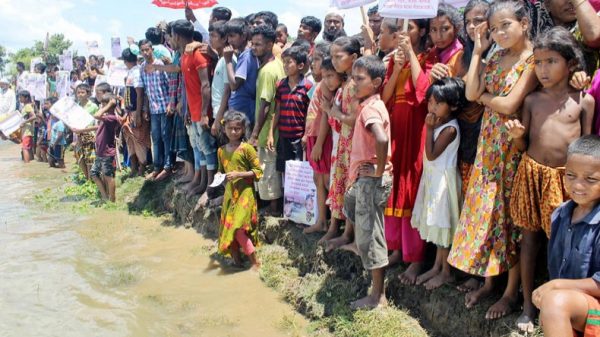Political divide, lack of democracy blamed for poor public relief show

Shawdesh Desk: Former student leaders and cultural activists observed that the relief activities by the socio-cultural and student organisations had seen a sharp decline this year while the country’s 28 districts were affected by severe flooding.
The spell of flood that began on July 9 spread over northern and central districts of the country, affecting over five million people directly and claiming over 100 human lives so far.
The affected people had to leave their homes to take shelter on nearby embankments and roads that were still above the water level and most of them were now in need of foods, clothes and medicines.
Talking to New Age on Saturday, the leaders pointed out that the society had become sharply polarised along political lines and time progressed people were getting more and more self-centred.
Some of them also pointed out that lack of democracy had impacted the student politics and cultural activities while members of the middle class who mostly played a vital role in such activities were now under financial duress, they said.
They also added that in the past few years, the income of the middle class did not increase and they were now financially weaker due to price hikes of daily commodities and services, besides additional burden of different types of taxes.
They said that once the country’s culture was such that activists of student and cultural organisations were first to respond to the crisis following any natural disaster. Today, this very culture seemed to have disappeared, they said.
The politicisation of the society unfortunately led to the current situation. People became cruel, losing their affection for one another, Workers Party of Bangladesh president Rashed Khan Menon pointed out.
Information and research secretary of Awami League Afzal Husein claimed that the flood did not take so serious a turn that the people would be worried. Besides, the government had taken measures to save the flood victims, he added.
Afzal, also a former student leader, said that the socio-cultural and student organisations have become badly politicised and that is why the past tradition to join hands in times of need were in gradual decline.
Bangladesh Nationalist Party senior joint secretary general Ruhul Kabir Rizvi said absence of democracy in the country and not allowing the main opposition student organisation activists in the country’s campuses for the past 10 years have changed the original characteristics of the student politics.
‘In the past, the campuses witnessed a democratic environment but that firmament has gradually disappeared,’ Rizvi said.
‘On the other hand, the character of the ruling party’s student organisation has changed over time. They have gradually adopted the gang culture. All this happened due to the absence of democracy,’ added Rizvi, a former vice-president of Rajshahi University Central Students’ Union.
‘If all the student organisations could practice their democratic rights, the scenario would have improved. The humanitarian response by the students during a natural disaster was once spontaneous, which is not happening now due to the absence of democracy,’ the former student leader alleged.
Communist Party of Bangladesh central leader Ruhin Hossain Prince said that the people in the society are suffering from fear and greed has taken over a certain quarter, isolating the people from one another. ‘As a result, we have becoming self-centred,’ he pointed out.
‘The middle class that used to lend their hands in such situation are suffering badly due to a decrease in their real income. They have become busy with making ends meet and are now unable to actively participate in campaigns to help the flood affected,’ he said.
Possibly, many were yet to understand the severity of the flood,’ he said.
Sammilita Sangskritic Jote president Ghulam Quddus said they did not begin their activities as the flood was not so serious.
Gram Theatre president Nasiruddin Yousuf Bachchu said that they, giving a call to all to begin relief activities to save the distress people, began the activities in the northern districts a week ago.
‘Yes, the activities of cultural organisations on humanitarian ground have decreased sharply. Situation has changed and it does not allow for voluntary works everywhere,’ Bangladesh Udichi Shilpigosthi general secretary Jamshed Anower Tapan told New Age.
Udichi has been doing relief works in all the affected districts in the north, he said.
Ashim Kumar Ukil, cultural secretary of Awami League and also a former student leader, said now the situation had changed. Flood victims were not as greedy as before to get relief but they wanted permanent solution to the flooding.
Some cultural and social organisations were active in relief distribution in the flood affected areas, Ashim added.
Zonayed Saki, chief coordinator of Ganasamhati Andolan, said their party along with the Left Democratic Alliance had already started relief works among the flood victims.
‘After the farcical general election held on December 30, people were still frustrated and they became less interested in facing various situations collectively,’ he added.
Saki said that in the face of inadequate patronisation from different business organisations and the rich people of the society, cultural and social organisations were now unable to pursue such campaigns.























Leave a Reply